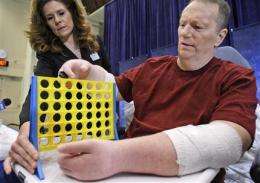1st US 2-hand transplant patient yearns to feel

(AP) -- The nation's first double hand transplant patient can wriggle his new fingers a litte bit now and grab a tennis ball, but what he really wants to do is be able to feel his wife's hands when he holds them.
Jeff Kepner held hands with his wife Thursday as he talked to news reporters about his recovery at the University of Pittsburgh Medical Center where he underwent the nine-hour surgery in early May.
So far, he has no feelings in his new hands because the nerves have not grown into them. Nerves grow about an inch a month, according to his doctors.
Kepner said he does daily therapy to develop muscle strength to use his hands, and he hoped to inspire others who need such surgery to consider it. He lost his hands and feet a decade ago to a bacterial infection, and said he did not want to undergo the surgery at first.
"I thought, 'Are you kidding me?' I said, 'There's no way I'm going to do that,'" Kepner recalled telling his wife when she told him about the possibility last fall.
Showing off his hands Thursday, Kepner said he's glad he went through the surgery. He had been ambivalent because he could manage with his prosthetics and had read that the world's first double hand transplant patient had to have the hands removed because his body rejected them.
But Valarie Kepner was persistent. She had contacted UPMC without telling her husband. She wanted him to be able to regain some of his independence after being on her schedule for years. She gets up for work at 4:30 a.m., and that meant he had to as well.
Eventually, Kepner met with Dr. W.P. Andrew Lee, the hospital's chief of plastic surgery, who helped put his mind at ease.
Lee said that for the May 4 surgery, 21 surgeons worked in teams of four: two prepared Kepner's forearms and two prepared the donor's hands. The teams worked simultaneously.
UPMC developed a protocol to reduce the amount of toxic anti-rejection medications that must be taken so that the hands are not rejected, Lee said. The medications can increase the risk for diabetes, infections and other complications.
While Kepner shows no sign of rejection and is making steady progress, it could be a year or two until he gains full movement of his fingers, Lee said. Kepner could be at the hospital another couple months.
Demonstrating some exercises, Kepner struggled a bit because the muscles in his fingers are tight. He tried passing a small ball between his hands and used his right hand to unstack a set of small cones and build another stack.
Kepner said he looks forward to being able to shower and cook, explaining he became a pastry chef after retiring from the Air Force.
"I want to try these hands out. I want to put them to use," he said. "It will really free me up and free her (Valarie) up. The independence will be nice, to get that back. And the touch and the feel. That's the big part for me."
Eight double hand transplants have been performed abroad. UPMC performed its first hand transplant in March on a Marine who lost his hand in a training accident. Lee said that patient is recovering well and can do crossword puzzles.
©2009 The Associated Press. All rights reserved. This material may not be published, broadcast, rewritten or redistributed.
















